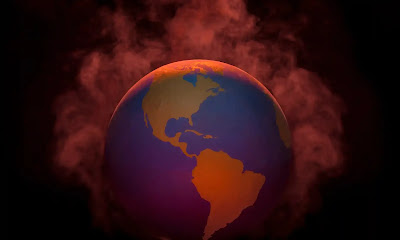Sleepwalking Into Dystopia
The climate science community is finally coming out of the closet.
Three weeks ago I had an exchange with a prominent climate scientist. I asked what were our chances of world governments rising to the challenge of climate breakdown in time to avert real disaster. My correspondent recommended that I watch de Caprio's NetFlix movie, "Don't Look Up." After watching the flick I chided my aquaintance for fear-mongering. Surely he was pulling my leg. No, he maintained. He was deadly serious.
An article in the Guardian/Observer mirrors this exchange. University College London emeritus professor, Bill McGuire, pulls no punches.
The crucial point, he argues, is that there is now no chance of us avoiding a perilous, all-pervasive climate breakdown. We have passed the point of no return and can expect a future in which lethal heatwaves and temperatures in excess of 50C (120F) are common in the tropics; where summers at temperate latitudes will invariably be baking hot, and where our oceans are destined to become warm and acidic. “A child born in 2020 will face a far more hostile world that its grandparents did,” McGuire insists.
“I know a lot of people working in climate science who say one thing in public but a very different thing in private. In confidence, they are all much more scared about the future we face, but they won’t admit that in public. I call this climate appeasement and I believe it only makes things worse. The world needs to know how bad things are going to get before we can hope to start to tackle the crisis.”
“And as we head further into 2022, it is already a different world out there,” he adds. “Soon it will be unrecognisable to every one of us.”
“Just look at what is happening already to a world which has only heated up by just over one degree,” says McGuire. “It turns out the climate is changing for the worse far quicker than predicted by early climate models. That’s something that was never expected.”
“This is a call to arms,” he says. “So if you feel the need to glue yourself to a motorway or blockade an oil refinery, do it. Drive an electric car or, even better, use public transport, walk or cycle. Switch to a green energy tariff; eat less meat. Stop flying; lobby your elected representatives at both local and national level; and use your vote wisely to put in power a government that walks the talk on the climate emergency.”
Now Chris Hedges adds his voice to the Dystopia Choir.
The ruling class for decades denied the reality of the climate crisis or acknowledged the crisis and did nothing. We sleepwalked into catastrophe. Record heat waves. Monster droughts. Shifts in rainfall patterns. Declining crop yields. The melting of the polar ice caps and glaciers resulting in sea level rise. Flooding. Wildfires. Pandemics. The breakdown of supply chains. Mass migrations. Expanding deserts. The acidification of the oceans that extinguishes sea life, the food source for billions of people. Feedback loops will see one environmental catastrophe worsen another environmental catastrophe. The breakdown will be nonlinear. These are the harbingers of the future.Social coercion and the rule of law will disintegrate. This is taking place in many parts of the global south. A ruthless security and surveillance apparatus, along with heavily militarized police, will turn industrial nations into climate fortresses to keep out refugees and prevent uprisings by an increasingly desperate public. The ruling oligarchs will retreat to protected compounds where they will have access to services and amenities, including food, water and medical care, denied to the rest of us.
Voting, lobbying, petitioning, donating to environmental lobby groups, divestment campaigns and protesting to force the global ruling class to address the climate catastrophe proved no more effective than scrofula victims’ superstitious appeals to Henry VIII to cure them with a royal touch. In 1900 the burning of fossil fuel – mostly coal – produced about 2 billion tons of carbon dioxide a year. That number had risen threefold by 1950. Today the level is 20 times higher than the 1900 figure. During the last 60 years the increase in CO2 was an estimated 100 times faster than what the earth experienced during the transition from the last ice age.
This time the whole planet will go down. There will, with this final collapse, be no new lands left to exploit, no new peoples to subjugate or new civilizations to replace the old. We will have used up the world’s resources, leaving the planet as desolate as the final days of a denuded Easter Island.
Collapse comes throughout human history to complex societies not long after they reach their period of greatest magnificence and prosperity.


This comment has been removed by the author.
ReplyDeleteI had read the Guardian piece earlier but not the Chis Hedges observations. Quite grim and quite accurate, I think. It really leaves little grounds for hope, eh, Mound?
Delete